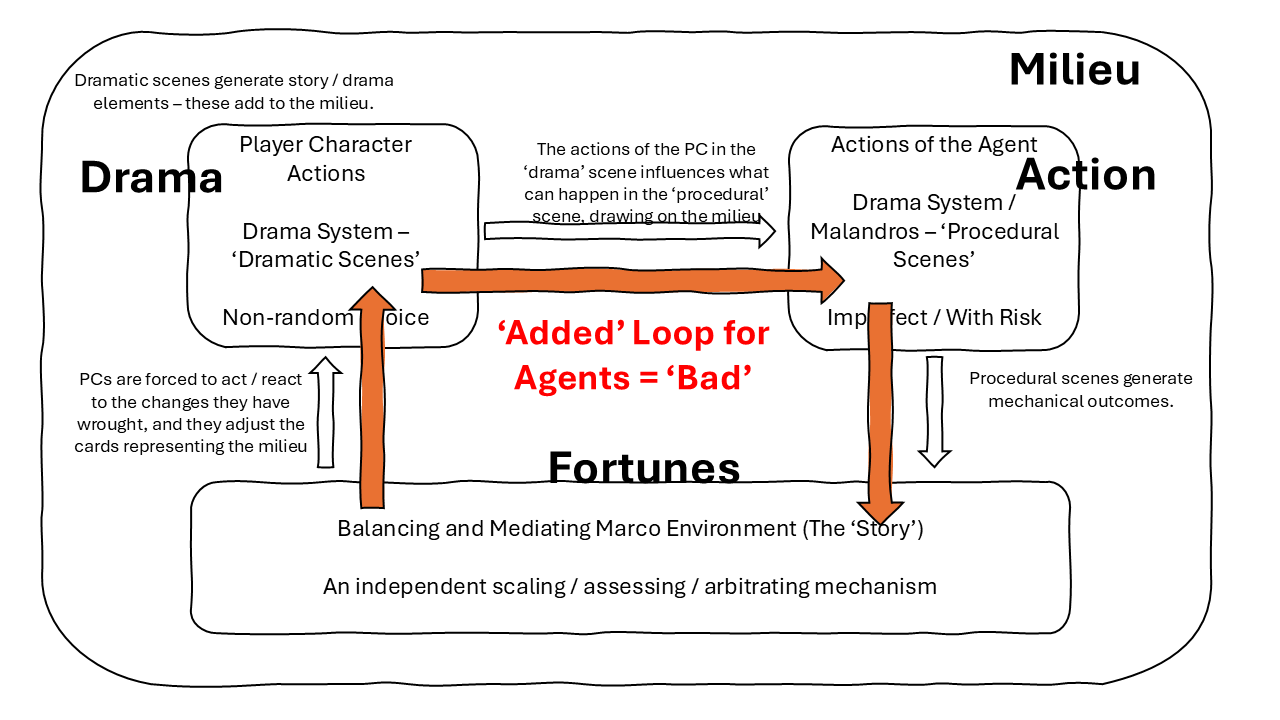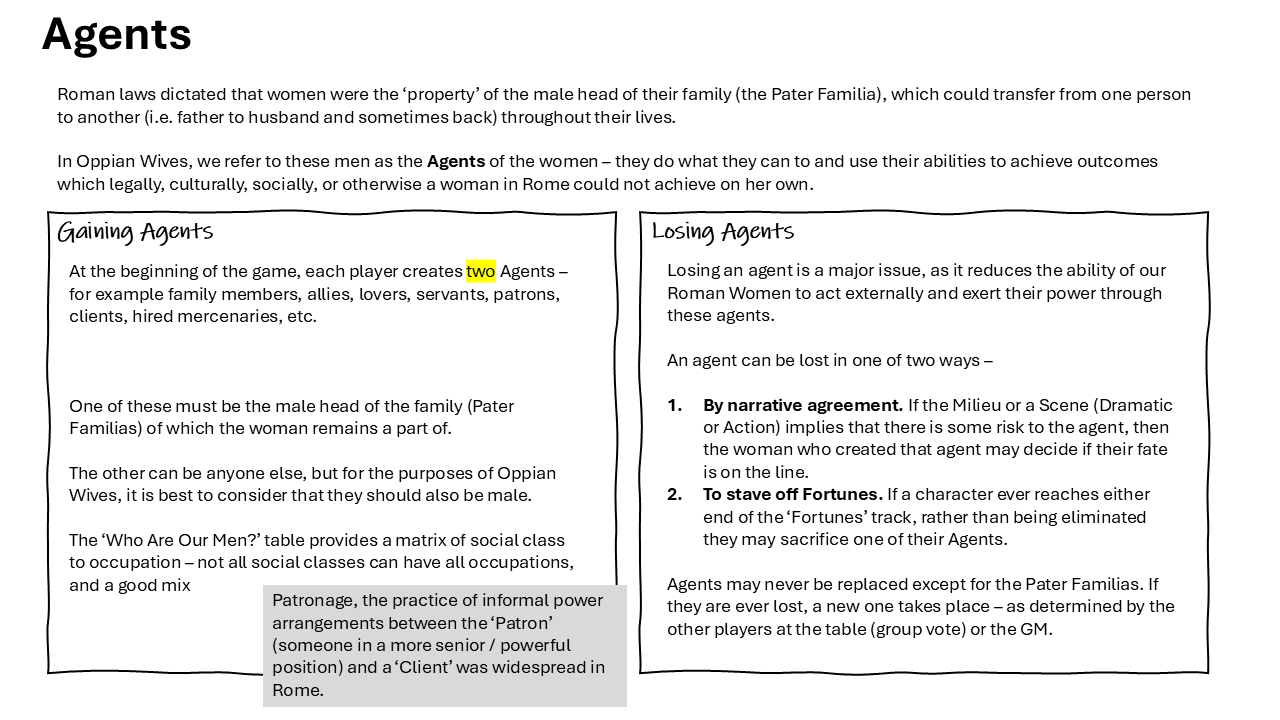Oh no, I accidentally created a ‘minigame’
Minigames have a place… but not here.
I’ve written previously about my need to strip things back to their core when it comes to rules – I hate vestigial rules that don’t make sense and little bits which trail off to nowhere that don’t engage back into and reinforce the ‘core loop’ of enjoyment and engagement. On that note then, something we don’t often rationally identify yet suffer through is the ‘minigame’ – a side thing to the main game, which (in my view) often takes us away from what we are really trying to create in our RPG.
I identify a minigame as something disconnected from the core loop (see earlier posts) that has to be done to maintain some element of the game rules – but doesn’t actually generate engagement, interest, or joy in it’s play itself. It might be amusing the first few times through the loop, but soon becomes a bog and a bore to get through to maintain the game state. There ARE valid times when the ‘minigame’ aspect is enjoyable and really helps build verisimilitude or perhaps as a fun way to do something, but again in my view they often become tiresome and distracting from the roleplaying we are here to do.
The accidental ‘Agent’ minigame in Oppian Wives
In Oppian Wives, ‘Agents’ are the external actors who do things on behalf of the women. I accidentally ‘bolted on’ this minigame of developing and losing Agents (see my earlier post on Agency in Politics). Agents are external actors to the player characters, and are essential to their identity and functioning - an example being the Pater Familia (head of the family) who controlled much of the lives of women in Rome.
In essence, what I did was to tie the gaining or losing of Agents for the women to a mix of their success and failure in the Action (procedural) scenes. An agent could be narratively harmed or even taken out of the game depending on how a procedural scene went, and then the woman would need to ‘buy’ them back (or create a new agent) by expending Drama Tokens (cards).
It all sounded good on the first pass, and I may even keep this minigame for something in the future, but it bugged me. It distracted from… well, the drama that I was looking for when using the Drama System as the core of this game. It mechanised the management of the Agents and turned that into too much of a focus, which distracted from the roleplaying of the women in Rome. When the "resource management" game came to the fore, the roleplay elements faded a little too much for my liking.
Recognising the minigame
Like I said, it bugged me – something felt off. To figure out what, I like to draw little pictures and self-check my thinking from time to time as you’ve likely seen by now if you are reading these updates. Visual representation is a key skill in problem solving (and not coincidentally a core part of my professional life outside of games) as it allows us to see things more clearly.
I highly recommend the works of Dan Roam (various visual problem solving books), Abby Covert (how to make sense of any mess), and Ken Watanabe (problem solving 101) as key books that you should be across if you are in any design related field (as game design is). The last is ‘100 things every designer needs to know about people’ by Susan M. Weinschenk – an absolutely brilliant summation of the core conclusions from decades of research into behavioural science, biology, and psychology. These books (and a couple more) sit next to my computer at all times – I reference them constantly.
Anyway, what did my picture show? It showed that I’d layered a secondary core loop over the top of my initial core loop – like an additional layer or procedure on top of what I already had. And that second loop layered over the primary loop was causing an increase in cognitive load (thinking about too much at once, and getting distracted / confused in our thinking) – see Weinshenk’s book or google it.
As a player, in my ‘drama’ scenes I should only be thinking about the dramatic needs and outcomes that I want to achieve, not considering the metagame and mechanics of how I need to develop and build my agents into a force to be reckoned with. So I had to remove it. But how?

Removing it
I did want Agents to be important to the game, but certainly not another thing to be mechanically ‘managed’ and meta-played as if they are just some resource tracking element like ammunition or spell slots in D&D type games. They, like our characters, are people.
I also wanted them to have a big narrative impact – losing an Agent would be a pretty big deal in game terms, when one of our women loses a trusted ally or faithful retainer. More so, losing the Pater Familia could be utterly catastrophic to one of our Roman women – this would imply that by death, divorce, marriage, or other dramatic means their entire family has been upended.
This led me to the ends of the Fortunes scale – major dramatic points in the game for any of the Oppian Wives. I had set the rule that when a character reached either end of that spectrum, they were eliminated – but then I thought what if they could lose an Agent and keep going? It would be a severely sore loss for that player character, but also might make a cool dramatic moment. So here we are.
I'm still undecided HOW many agents to start with and will take that into playtesting.
Too many and we hit that same ‘cognitive load’ issue (i.e. managing not only your PC, but THREE NPCs as well might be too much for any player).
Get Oppian Wives
Oppian Wives
A playtest / ashcan of the game of women in Roman politics
| Status | Prototype |
| Category | Physical game |
| Author | Smoggy AU |
| Tags | ausrpg, Tabletop role-playing game |
More posts
- Draft 0.1 is Ready for Playtest!Feb 12, 2025
- The Final (Writing) PushJan 29, 2025
- Procedural (Action) ScenesJan 13, 2025
- GM or GM-Less?Jan 06, 2025
- Currencies, Bennies, Points, Tokens – Rewards and the 'Core Loop'Dec 16, 2024
- The Milieu (shared imagined space)Dec 09, 2024
- Roman Mosaic BuildingDec 04, 2024
- Why Women? And Politics?Dec 02, 2024
- Social PVP Mechanics in RPGsNov 27, 2024
Comments
Log in with itch.io to leave a comment.
P.S. you can read 'How to make sense of any mess' by Abby Covert free online here thanks to her generosity: https://abbycovert.com/make-sense/